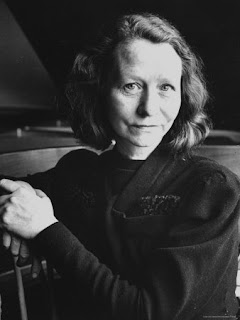The Corrections to the Corrections
.jpg)
I’ve been quiet for a week because my Mansfield manuscript has bounced back across the internet and it coincided with running a tutorial for my Open University creative writing students.
I’m now at the stage of the book where we are doing the corrections to the corrections. I’ve had a bit of a tussle with the editor because of the style. The biography is written, experimentally, in the present tense, to try and convey a sense of Katherine’s life as it was lived, rather than looking back on it with the biographer’s privilege of hindsight. And because the present tense gives such an informal feel to the narrative, I’ve opted for an informal style, which I hope is more readable. Somehow colloquial contractions such as she’s, can’t, doesn’t, won’t, etc seem to fit the rhythm of the present tense much better than she is, cannot, does not etc. But it seems that this might compromise my academic credibility! However, I’m digging in. The following is an example - where Katherine and her friend Ida are living in Italy; Katherine is ill and the hapless Ida is trying to look after her:
I’m now at the stage of the book where we are doing the corrections to the corrections. I’ve had a bit of a tussle with the editor because of the style. The biography is written, experimentally, in the present tense, to try and convey a sense of Katherine’s life as it was lived, rather than looking back on it with the biographer’s privilege of hindsight. And because the present tense gives such an informal feel to the narrative, I’ve opted for an informal style, which I hope is more readable. Somehow colloquial contractions such as she’s, can’t, doesn’t, won’t, etc seem to fit the rhythm of the present tense much better than she is, cannot, does not etc. But it seems that this might compromise my academic credibility! However, I’m digging in. The following is an example - where Katherine and her friend Ida are living in Italy; Katherine is ill and the hapless Ida is trying to look after her:
‘Katherine and Ida, living together in such a small place, are soon quarreling. Katherine wants – needs – Ida to be everything she’s not. They can’t get a maid because the local girls are all afraid of catching TB, so Ida has to cope alone with their domestic affairs. She’s stubborn, clumsy and inept; her appetite for food revolts Katherine, and her terror of offending or doing the wrong thing drives her to a frenzy of irritation. Ida is also impractical: she breaks dishes, glasses, thermometers, wastes money on fuel because she doesn’t know how to operate the chimney flue and burns the meals. There are times when Katherine hates Ida so much she’s almost consumed by it. Ida, aware of her feelings, does her best to remain in the background and wait until the fit is over.’
‘It’s a queer thing how craft comes into writing. I mean down to details....... In Miss Brill I chose not only the length of every sentence, but even the sound of every sentence - I chose the rise and fall of every paragraph to fit her - and to fit her on that day at that very moment. After I’d written it I read it aloud - numbers of times - just as one would play over a musical composition, trying to get it nearer and nearer to the expression of Miss Brill - until it fitted her.
.......... I often wonder whether other writers do the same. If a thing has really come off it seems to me there mustn’t be one single word out of place or one word that could be taken out. That’s how I AIM at writing. It will take some time to get anywhere near there.’
Now, thanks to my Penguin editor (who must be almost cross-eyed with the strain of going through 200,000 words yet again with a fine tooth-comb) and a lot of eye-strain on my own part, the manuscript is as honed as we can get it. I can’t wait to see it in print, but at the moment I can hardly believe it will ever get there. And now I have to sort the illustrations ..........


You have been busy. And I know from my own experience going cross-eyed is probably the least of your worries when editing. Going round the bend seems as likely to me.
ReplyDeleteI think the extract you have chosen flows nicely. You convey the desperate situation Mansfield must have been facing really well.
As to cons of your style I think they are limited. The question, I suppose, is what is your market for the biography. For a general reader I think the experiment will pay off. As to someone with a more specialised interest, what should count is the strength of your research. If you deliver the goods the style of writing shouldn't matter. From my own point of view when I have read anything for an academic reason it has been a bonus when something has been crafted with reading in mind.
I dream of being as technically competent as Mansfield. It must have been a pleasure to research her.
Thanks Al. I'm glad you think the same as I do - it's the research that should count, not whether it's written in a boring academic-stereotypical style. I want it to be read by people for pleasure, not just students writing essays.
ReplyDeleteLike you - I dream of reaching Mansfield's ideal standard!
Kathleen
I think the extract you have chosen flows nicely.
ReplyDeleteWork from home India